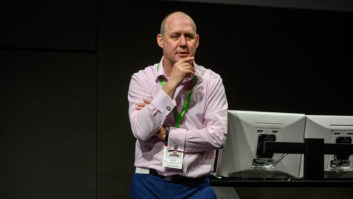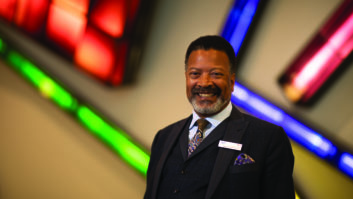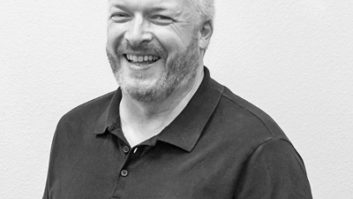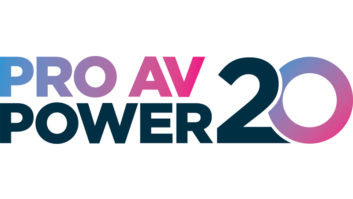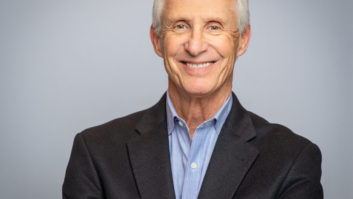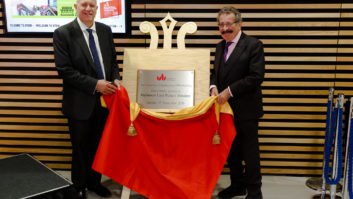#1 Mike Blackman, managing director, Integrated Systems Events
How did you first get involved in the AV marketplace?
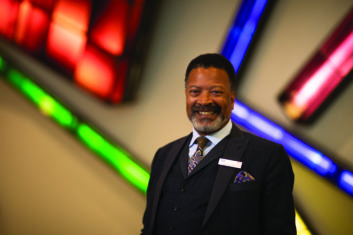 I have always been a technology fan starting in 1977 with a Commodore pet at home. In 1984 I took over the sales for the Personal Computer World Show in London as my first foray into the exhibition industry. After launching numerous tech events across Europe I was approached by a headhunter in 2003 to start a new event for the AV industry in Europe. The following year we launched the first ISE in Geneva. It was quite a challenge during the first months, single handedly calling and visiting the top AV companies to try to persuade them to commit to an unproved concept.
I have always been a technology fan starting in 1977 with a Commodore pet at home. In 1984 I took over the sales for the Personal Computer World Show in London as my first foray into the exhibition industry. After launching numerous tech events across Europe I was approached by a headhunter in 2003 to start a new event for the AV industry in Europe. The following year we launched the first ISE in Geneva. It was quite a challenge during the first months, single handedly calling and visiting the top AV companies to try to persuade them to commit to an unproved concept.
What would you say are the most significant changes/developments to have taken place in the industry during your time?
I think the most significant must be the ‘IT-ification’ of the AV industry. Over the past couple of decades we’ve gone from analogue to digital technology and then to networked systems. This has had numerous effects on the industry, but here are three of the biggest. On the people side, AV departments have become more closely linked with IT teams, and each discipline has had to learn about the other. On the technology side, there has been a slow migration from dedicated hardware to standard IT platforms. And tied into that, the contribution of software to the value of AV products is rising the whole time.
What personal, professional achievements are you most proud of?
I am always proud to have created new things or be the instigator of activities or events that move industries forward or give others a platform to achieve more. I am proud to have been the creator of ten new tech trade shows in seven different countries, but most of all the most exciting and the most sense of achievement has been in starting ISE from nothing to the success that it is now. ISE has given me the platform to also create initiatives (like our hosted buyer programmes, young AV professionals programmes and conferences) to open up the AV world to new users and help attract new and younger talent to our industry.
Do you have a philosophy that you live by professionally? If so, what is it and how has it benefitted your career/those you’ve worked with/the wider industry?
My philosophy has always been to “not be restricted by traditional barriers and always to aim higher than the targets”. Job satisfaction plays a major role and I always tell my children and my team if you don’t want to get up for work in the morning, get another job. My motivation is to enjoy what I am doing and make what I am doing successful by finding the right people to help me achieve that.
I have built a team around me at ISE of professionals who are good at what they do but even better at what I can’t do or am not good at. This has always helped to achieve success in all of my businesses. The AV industry certainly benefits from a team of professionals who not only curate programmes and events that benefit the market but also bring together the key buyers and sellers in this market.
- Installation’s exclusive webcast with ISE MD, Mike Blackman
- ISE 2021 moves to new dates in June
- ISE hosts session at The Next Web virtual conference
Prior to the outbreak of the global pandemic, what would you say were the biggest areas of technological or operational challenge for the AV industry?
There has been a significant volume of mergers and acquisition activity in recent years (although this has now mostly put on hold during the pandemic). As the industry matures, smaller integrators are at risk of being squeezed out by their larger, multinational counterparts; they need to work out whether they have enough of a specialised skill set to stand on their own, or if their future lies within a larger organisation. And more generally within the channel, there is a need for every organisation to continually review its strategy to ensure that it is still adding value.
What impact has the pandemic had on you and your business, and what do you think will be the longer term impact of this extraordinary period on our sector?
After we started Integrated Systems Events in 2003 we built the organisation as a decentralised company with many employees working from home. We focused on getting the right people whilst offering them the opportunity to stay in their own comfortable environments. The result was we were forced to use collaborative solutions to be able to work as a team from the beginning. We now have offices in four locations but still with a third of the team working from home offices. With cloud-based collaboration solutions and tools we have moved everyone to home office and have been able to continue working almost as usual. Despite this we are seeing many of our existing and potential new customers suffering. Not only are we having to adjust our expectations for the next ISE but also how we help and are working with our customers both financially and business wise. We have also had to look at the practical side of running exhibitions in a pandemic environment and are being creative with new ideas on how to continue organising successful shows.
What needs to change in the industry? What do we as a community need to get better at?
Although we have made significant strides in recent years, we still need to do a better job at informing the wider world about what this industry does – and, in some cases, that it even exists. This is not only to ensure that every project that involves AV equipment benefits from qualified designers and installers; we also need to make sure that we recruit the next generation of AV professionals and pass our knowledge and our skills on to them.
Another area where we need to do more is diversity. The industry is still more male, more middle-aged and more white than it should be. We should be drawing on a wider pool of talent to build the industry of the future. There are a number of excellent organisations and initiatives that are looking to effect change in these areas, but ultimately it is a challenge for every single person within this industry.
In your opinion, what will be the biggest driver(s) of change for the AV market in the next five years?
I honestly believe it is this pandemic. It’s driving change right now, and will continue to do so as the restrictions are eased. In many areas of business and everyday life, digital, virtual and remote technologies have been quickly adopted because they offer the only alternative to face-to-face interaction or close-quarters working. Going forward, now that the hurdles to acceptance have been overcome, uptake will become much more rapid.
Finally, what would be your message to those starting out their careers in the AV community?
Welcome: you’re embarking on a very rewarding and fulfilling career! There are all kinds of free and low-cost ways that you can boost your knowledge, build your connections and develop your career; networking groups and organisations, free training sessions from associations and manufacturers, and so on. This is a friendly and open industry, and it’s well worth putting in a little time and effort to help yourself progress in your chosen field.
Quickfire round
Who has had the greatest influence on your career?
Randy Lemke, former AVIXA CEO
Who did/do you look up to as a role model professionally?
Sandy Angus and Brian Montgomery, former chairmen of Andy Montgomery Ltd (my first job in the Exhibition Industry), and also past presidents of UFI (The Exhibition Industry association)
How do you measure success?
Success for me is the satisfaction achieved for our customers and stakeholders and overachieving on their expectations
What’s your biggest professional regret?
I met Tim Berners-Lee in 1989 and he tried to explain the Hypertext system they were developing at CERN. He wanted to launch it at a show that I had planned later that year. My answer was it sounded interesting but what could you do with it? (I wish I could have googled WWW then.)
If you were a teenager today, what profession would you go into?
I still think I would want to organise technology exhibitions. Despite current social distancing regulations people still want to meet and connect with their peers and do business face-to-face. Tech has the advantage that it is constantly evolving and remains exciting.
